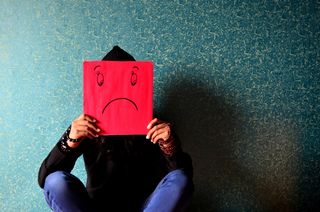Media
The Social Media Disconnect
Social isolation in the time of social media connection.
Posted February 26, 2018 Reviewed by Jessica Schrader
This guest post was contributed by Annemarie Kelleghan, a graduate student in the USC Psychology Department's Clinical Science program.
Last Friday, at the end of a painfully busy, long work week, I left the office with a skip in my step (or more accurately, I would have been skipping if I wasn’t so tired). As I got into my car and pulled out of the parking lot, my thoughts turned to the dinner plans I had made with a small group of friends. By the time I pulled into the driveway at home, I was ready for a fun night. My friends, on the other hand, were not. A quick look at my phone showed a flurry of messages. My friends had other last-minute obligations pop up. Children, partners, and exhaustion all got in the way. No more plans for my Friday night.
I went inside the house, telling myself that a quiet night at home was just what I needed. I ordered food in, took a shower, and started eating dinner on the couch. With my phone. I absentmindedly began to scroll through social media feeds to see what everyone else was up to. Instagram, Snapchat, Facebook … it all went downhill from there. Why do I have nothing to do on a Friday night? Why can’t I find anyone to hang out with? And then my catastrophic conclusion: I must be lonely.
I think we’ve all had those Friday nights. On nights like these, pessimistic studies of social media use and mental health seem to make a lot of sense. Researchers have found that people who use multiple social media platforms report more symptoms of anxiety and depression. Longer or more frequent use of social media also appears to predict depressive symptoms. However, not all of the research on social media use and mental health yields a doom and gloom forecast. People use social media in many different ways. When you plug into social media to strengthen existing relationships, your mental health outcomes may be very different than when you scroll through social media out of desperation or loneliness.

My Friday night meander down social media lane was not motivated by a desire to increase my connections with specific friends, but rather an attempt to break out of my lonely mood. However, it turns out that social media may not be the most effective way to lessen feelings of social isolation. A group of researchers in South Korea surveyed 300 young adults aged 19-39 to better understand the relationship between social media use for seeking connectedness versus avoiding social isolation. Participants reported their use of social media, face-to-face communication, perceived social isolation, social connectedness, and subjective well-being. The researchers found that face-to-face communication increased subjective well-being by both increasing connectedness and decreasing social isolation. Social media use, on the other hand, only increased subjective well-being through increasing connectedness, but not through decreasing social isolation. Because social media does not resolve our feelings of social isolation, the negative health effects of social isolation can insidiously creep into our lives if we aren’t able to find more effective ways of decreasing our feelings of social isolation.
Social isolation is not simply a pesky problem that might lead to late-night social media binges. Social isolation is also associated with negative long-term health concerns. Researchers in the Netherlands studied a group of individuals with and without diabetes. They measured glucose metabolism, impaired fasting glucose, and impaired glucose tolerance, all measures used to diagnose diabetes. The researchers also assessed participants’ social networks, asking how many people they interacted with on a daily and weekly basis and how often they saw friends and family. Results indicated that smaller social networks were associated with increases in newly diagnosed diabetes for men and women. Furthermore, a 10% drop in the number of social network members living within walking distance of the participant was associated with increased odds of being newly diagnosed with diabetes. While this study does not provide evidence that social isolation causes diabetes, it does suggest that social isolation is at least a marker of more serious health concerns.
Social isolation has also been associated with an increased risk of mortality in a four-year follow-up study of male health professionals. This study assessed social connection measured by frequency and number of social contacts, marital status, and community group membership in a sample of approximately 50,000 men, all of whom endorsed no diagnosis of cancer, stroke, or heart attack when they reported on their social isolation. Four years after the survey was sent out to participants, mortality surveillance commenced. Family and work reports, as well as the National Death Index, were used to identify participants who had passed away. Compared to the men with the most social connection, those with the greatest social isolation had a greater risk of mortality during the follow-up period. Although no association between cancer and social isolation was found, individuals who were socially isolated had an increased risk of mortality by cardiovascular disease, accident, or suicide. These data indicate that social isolation predicts specific-cause mortality over time.

But if social isolation is related to so many negative health outcomes—both physical and psychological—and scrolling through social media doesn’t seem to solve the problem, what can we do? In our current digitally connected world, seeking out social media to reduce social isolation may seem like a logical step (it is called social media after all!). However, the research indicates that we will likely benefit more from increasing face-to-face communication when trying to stymie social isolation. Instead of retreating into the perceived comfort of our phones, we need to put down our devices and engage with those in the world around us (and not the world wide web around us). While a little bit of social media usage isn’t a bad thing, make an effort to stop scrolling long enough to say hi to your neighbor before leaving for work in the morning. Engage in the awkward social chatter with the cashier at the grocery store. Join a club or an organization that actually meets up in person. Have friends over for dinner, and consider a back-up plan for when they flake out (or just find some less-flaky friends!), and remember that there are so many ways to be social that don’t involve social media.
References
Brinkhues, S., Dukers-Muijrers, N. H., Hoebe, C. J., van der Kallen, C. J., Dagnelie, P. C., Koster, A., ... & Bosma, H. (2017). Socially isolated individuals are more prone to have newly diagnosed and prevalent type 2 diabetes mellitus-the Maastricht study–. BMC public health, 17(1), 955.
Kawachi, I., Colditz, G. A., Ascherio, A., Rimm, E. B., Giovannucci, E., Stampfer, M. J., & Willett, W. C. (1996). A prospective study of social networks in relation to total mortality and cardiovascular disease in men in the USA. Journal of Epidemiology & Community Health, 50(3), 245-251.
Primack, B. A., Shensa, A., Escobar-Viera, C. G., Barrett, E. L., Sidani, J. E., Colditz, J. B., & James, A. E. (2017). Use of multiple social media platforms and symptoms of depression and anxiety: A nationally-representative study among US young adults. Computers in human behavior, 69, 1-9.
Primack, B. A., Shensa, A., Sidani, J. E., Whaite, E. O., yi Lin, L., Rosen, D., ... & Miller, E. (2017). Social media use and perceived social isolation among young adults in the US. American journal of preventive medicine, 53(1), 1-8.
Shensa, A., Escobar-Viera, C. G., Sidani, J. E., Bowman, N. D., Marshal, M. P., & Primack, B. A. (2017). Problematic social media use and depressive symptoms among US young adults: A nationally-representative study. Social Science & Medicine, 182, 150-157.


